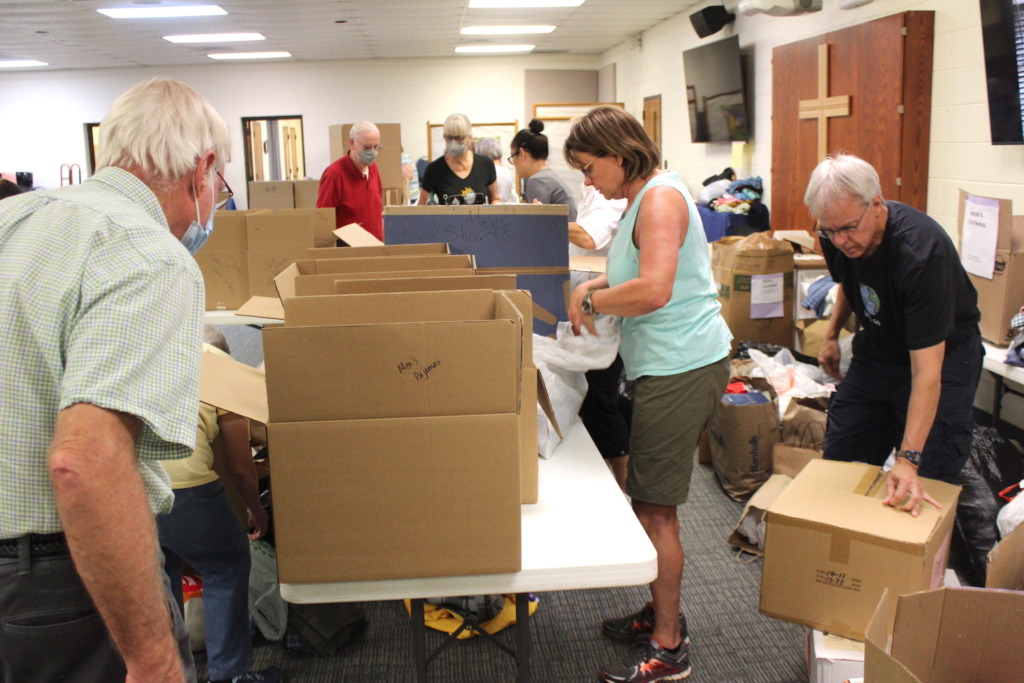Four parishes’ collection for Eastern Shore workers ‘gifts from mountains to sea’
For the past two years, the annual collection of items for migrant workers by the four Catholic parishes in the Roanoke Valley has lain fallow, suspended by restrictions on access to the camps on Virginia’s Eastern Shore during the pandemic.
But now, the harvest of clothes, household items and toiletries is back, and the workers to sort and pack it all were many in number.
“The amazing thing to me is we never have to have a sign-up for sorting and packing night because people just show up, and we always have a lot of help,” said Mary Jo Truskey, who has been involved in this ministry for about 12 years.
The donation boxes have been filling up since the end of May at Our Lady of Nazareth, St. Andrew and St. Gerard in Roanoke, and Our Lady of Perpetual Help in Salem. On Pentecost evening, June 5, coordinator Mary Branisteanu watched a rented truck fill with “gifts from the mountains to the sea.”
“I can’t tell you how happy they are knowing that the Roanoke Valley is sending donations this week,” she said a few days earlier. “It’s always heartwarming to see the generosity of all the parishioners, and I really feel that this is what the four parishes enjoy most — that we’re all able to work together.”
Like parents fetching hidden Christmas presents, people brought bags and boxes of donations into the OLN fellowship hall. About 30 volunteers sorted the men’s and women’s clothing, household goods like pots and pans, religious items like rosaries and crucifixes, rows of soap and shampoo, and packed everything in cartons.
In a couple of hours, the 20- foot rental truck from St. Peter the Apostle, Onley, was full. “The need is tremendous,” said Branisteanu.
“The workers do save their jeans and jacket that they get and maybe a cap. They will fold them up and put it under their bed at the camp with the hope that they will be able to return next year and pick again.”
For some volunteers, migrant ministry is almost year-round work.
“They begin to shop the sales, they begin to collect T-shirts and caps and toiletries, and they’re ready for us and begin asking about us when late winter comes,” Branisteanu said. “They enjoy the friendship. They enjoy the involvement, and it’s also a multigenerational activity that people can enjoy together.”
St. Peter parishioner Kathy Bredimus is a seasoned hand at migrant ministry, making her first visits to the camps more than 20 years ago. She said about 1,600 workers are coming to the Eastern Shore this summer, part of some 300,000 workers with temporary agricultural visas expected in America’s fields, orchards and canning plants this year.
“We go out to the camps one day a week and distribute material goods,” she said, before joining the sorting. “And then we have Mass at the camp one day a week. We stress that we are the face of the Catholic Church when we go into those camps. We bring prayer, we bring the Mass, we bring counseling for people that need it.”
Most are men from Mexico; some are from Haiti. Older women arrive, too, to work in the processing plants. The field workers come in April for late spring planting and may stay through October, which could mean working in cold, damp weather. Migrant ministry supplies blankets and hoodies, too. The picking of tomatoes and watermelon will be done in the summer heat, six days a week, even in the rain unless lightning appears.
Almost all of the workers try to send money to their families. That’s much easier to do when their clothes and other basic items come from the Church instead of from their own pocket, though Bredimus said she and other migrant ministers stress that “everything we bring you comes from God. It’s not our goodness and our richness flowing onto you. It comes from God.”
During the two-year hiatus, Branisteanu said the OLN migrant ministry sent some money to the Eastern Shore parishes to make up for the loss of donated goods. Those involved in the collection program said this can be more effective than cash handouts.
“The parishes in the valley are very, very generous,” said Truskey. “And I believe that with all of the donations we get in all of the different categories, we can provide so much more that way than through a monetary donation.”
The line of boxes leaving the fellowship hall grew shorter as the pile in the van climbed higher. The turnaround was quick. The truck needed to be back in Accomack the next day; the distribution of the donations would be done by the end of the week.
Along with the other shore parishes – St. Charles, Cape Charles, and St. Andrew the Apostle, Chincoteague – Bredimus said St. Pius X, Norfolk, and Church of the Ascension, Virginia Beach, have active migrant ministries. If others are interested, Branisteanu said her group would coach them along “because it is a wonderful way to live the Gospel. We’re doing what we’re supposed to be doing. It is all about kindness, it’s all about generosity, and it’s about caring for those who need our help.”

